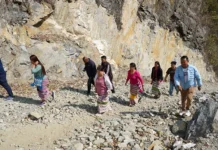NEW DELHI, 4 Oct: The union environment ministry has raised concerns over the increasing number of proposals for smaller hydropower projects with capacities below 5 MW in hill states such as Himachal Pradesh, Uttarakhand and Sikkim as these have the potential to disrupt the natural flow of rivulets and adversely affect aquatic fauna.
The ministry’s Forest Advisory Committee discussed the issue in a meeting on September 11, the minutes of which were recently made available.
The panel recalled that the ministry had in 2011 directed all states to conduct Cumulative Impact Assessment Studies and carry out capacity studies for their river basins.
It noted that such studies have been successfully completed for 13 river basins across five states so far.
The purpose of such studies is to gauge the cumulative impact of hydropower projects within a river basin. These comprehensive studies cover a range of factors, including evaluating environmental consequences, biodiversity implications, management of muck disposal sites, traffic management in the region, and
addressing issues related to rehabilitation and resettlement, according to the Forest Advisory Committee.
The panel highlighted that most Cumulative Impact Assessment Studies primarily emphasise hydropower projects with installed capacities exceeding 25 MW. However, they do cover projects with capacities of 5 MW and above.
The committee expressed concerns over the increasing number of proposals for smaller hydropower projects, particularly those with capacities below 5 MW, in hill states such as Himachal Pradesh, Uttarakhand, Arunachal Pradesh and Sikkim. Smaller tributaries and rivers have become focal points for such projects, it said.
“Even smaller projects on third order tributaries may impede with the natural flow of rivulet and thereby impact the aquatic fauna as these projects are of smaller installed capacity but their number is relatively higher,” according to the minutes of the meeting.
The panel noted that these smaller projects have the potential to disrupt the natural flow of rivulets and adversely affect aquatic fauna, including species such as trout and masheer that rely on these waters for breeding, the committee noted.
It also acknowledged the challenges in assessing the impact of these smaller projects due to the absence of long-term plans from state governments and credible assessments of their influence on hydrological regimes and aquatic ecosystems.
Since the matter falls within the purview of the ministry’s Impact Assessment Division, the panel decided to seek expert opinion from it and revisit the issue in the upcoming committee meeting.(PTI)




